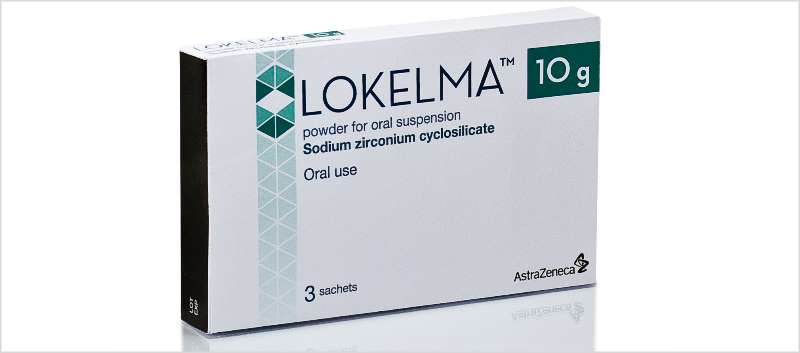Phase III HARMONIZE Global trial of Lokelma confirms efficacy in maintaining normal potassium levels in Asian patients with hyperkalaemia
Source: AstraZeneca Oct 30, 2018 6 years, 5 months, 3 weeks, 6 days, 10 hours, 47 minutes ago
Data show Lokelma maintained normokalaemia during days 8-29 of the maintenance phase in patients from four Asian countries
AstraZeneca today presented the results from the HARMONIZE Global Phase III trial, which investigated the safety and efficacy of
Lokelma (sodium zirconium cyclosilicate) vs. placebo in patients with hyperkalaemia in Japan, Korea, Taiwan and Russia. The results were presented at the American Society of Nephrology (ASN) Kidney Week 2018, San Diego, California, US.
Hyperkalaemia is a serious condition characterised by elevated potassium levels in the blood associated with cardiovascular, renal and metabolic diseases.
1,2,3,4
HARMONIZE Global is a randomised, multicentre, double-blinded, placebo-controlled trial involving 267 patients with hyperkalaemia (mean potassium levels greater than 5.0 mEq/L) in 47 study locations across the Asia Pacific region. Patients who achieved normokalaemia (mean potassium levels of 3.5-5.0 mEq/L) during the first 48 hours with
Lokelma 10g three times daily (93%; n=248) progressed to the 28-day maintenance phase of the trial. Patients in the maintenance phase were randomised to receive
Lokelma 5g or 10g, or placebo, administered once daily. Results show normokalaemia was maintained with statistically-significant differences observed, irrespective of dose, for
Lokelma vs. placebo in terms of mean potassium levels during days 8-29 of the maintenance phase.
The safety profile of
Lokelma observed in HARMONIZE Global was consistent with previous trials.
Elisabeth Björk, Vice President, Head of Cardiovascular, Renal and Metabolism, Global Medicines Development, AstraZeneca, said: “The positive results of HARMONIZE Global add to the growing body of evidence supporting the use of
Lokelma for adults with hyperkalaemia, a serious condition associated with chronic kidney disease, heart failure and diabetes as well as the use of renin-angiotensin-aldosterone system inhibitors. Through our robust clinical programme we are committed to assessing the potential of
Lokelma in the broadest range of patient populations possible, including markets with high unmet
medical need.”
Lokelma is currently approved for the treatment of hyperkalaemia in adult patients in the US and the EU.
Registrations in other markets are planned. Data from the HARMONIZE Global Phase III trial will support registration in Japan, Korea, Taiwan and Russia.
NOTES TO EDITORS
About Hyperkalaemia
The risk of hyperkalaemia increases significantly for patients with chronic kidney disease (CKD) and for those who take common medications for heart failure (HF), such as renin-angiotensin-aldosterone system (RAAS) inhibitors, which can increase potassium in the blood. Hyperkalaemia occurs in 23% to 47% of patients with CKD and/or HF, with an estimated 200 million and 38 million people, respectively, living with e
ach condition worldwide. Hyperkalaemia may lead to cardiac arrest and death, with mortality being up to 30% in patients with severe hyperkalaemia.
About Lokelma
Lokelma is an insoluble, non-absorbed sodium zirconium silicate, formulated as a powder for oral suspension, that acts as a highly-selective potassium-removing agent. It is administered orally, is odourless, tasteless and stable at room temperature. It has been studied in three double-blinded, placebo-controlled trials and in one 12-month open label clinical trial in patients with hyperkalaemia. The recommended starting dose of
Lokelma is 10g, administered three times daily. Once normokalaemia (normal potassium levels in the blood) has been achieved, a maintenance dose of 5g once daily is recommended with possible titration up to 10g daily or down to 5g once every other day to maintain a normal potassium level.
About AstraZeneca in Cardiovascular, Renal & Metabolism (CVRM)
Cardiovascular, renal and metabolism together form one of AstraZeneca’s main therapy areas and a key growth driver for the Company. By following the science to understand more clearly the underlying links between the heart, kidneys and pancreas, AstraZeneca is investing in a portfolio of medicines to protect organs and improve outcomes by slowing disease progression, reducing risks and tackling co-morbidities. Our ambition is to modify or halt the natural course of CVRM diseases and potentially regenerate organs and restore function, by continuing to deliver transformative science that improves treatment practices and cardiovascular
health for millions of patients worldwide.
About AstraZeneca
AstraZeneca is a global, science-led biopharmaceutical company that focuses on the discovery, development and commercialisation of prescription medicines, primarily for the treatment of diseases in three therapy areas - Oncology, Cardiovascular, Renal & Metabolism and Respiratory. AstraZeneca operates in over 100 countries and its innovative medicines are used by millions of patients worldwide.
For more information, please visit
astrazeneca.com and follow us on Twitter
@AstraZeneca.
CONTACTS
| Media Relations |
|
|
| Karen Birmingham |
UK/Global |
+44 203 749 5634 |
| Rob Skelding |
UK/Global |
+44 203 749 5821 |
| Matt Kent |
UK/Global |
+44 203 749 5906 |
| Gonzalo Viña |
UK/Global |
+44 203 749 5916 |
| Jennifer Hursit |
UK/Global |
+44 203 749 5762 |
| Jacob Lund |
Sweden |
+46 8 553 260 20 |
| Michele Meixell |
US |
+1 302 885 2677 |
References:
1 Kosiborod M, Rasmussen HS, Lavin P, et al. ‘Effect of Sodium Zirconium Cyclosilicate on Potassium Lowering for 28 Days Among Outpatients With Hyperkalemia.’ JAMA. 2014. doi:10.1001/jama.2014.15688.
2 Packham D, Rasmussen HS, Lavin P, et al. ‘Sodium Zirconium Cyclosilicate in Hyperkalemia.’ New Engl J Med. 2015; 372:222-31. doi:10.1056/NEJMoa1411487.
3 Ash S, Bhupinder S, Lavin P, et al. ‘A phase 2 study on the treatment of hyperkalemia in patients with chronic kidney disease suggests that the selective potassium trap, ZS-9, is safe and efficient.’ Kidney Int. 2015; 88:404-411. doi:10.1038/ki.2014.382.
4 National Kidney Foundation. ‘Clinical Update on Hyperkalemia." 2014. Accessed 5 January 2017. https://www.kidney.org/sites/default/files/02-10-7260%20Clinical%20Bulletin.pdf.
